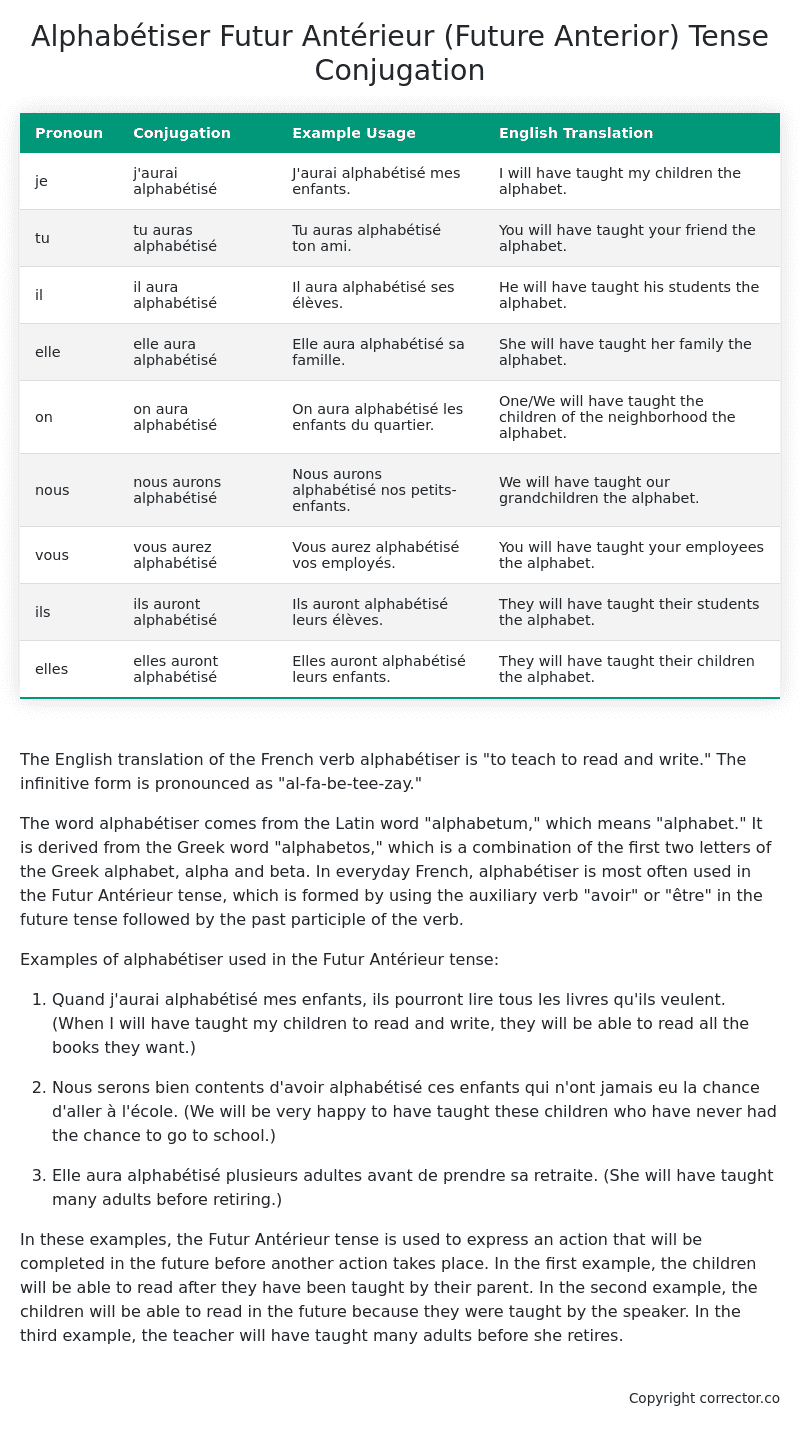Futur Antérieur (Future Anterior) Tense Conjugation of the French Verb alphabétiser
Introduction to the verb alphabétiser
The English translation of the French verb alphabétiser is “to teach to read and write.” The infinitive form is pronounced as “al-fa-be-tee-zay.”
The word alphabétiser comes from the Latin word “alphabetum,” which means “alphabet.” It is derived from the Greek word “alphabetos,” which is a combination of the first two letters of the Greek alphabet, alpha and beta. In everyday French, alphabétiser is most often used in the Futur Antérieur tense, which is formed by using the auxiliary verb “avoir” or “être” in the future tense followed by the past participle of the verb.
Examples of alphabétiser used in the Futur Antérieur tense:
-
Quand j’aurai alphabétisé mes enfants, ils pourront lire tous les livres qu’ils veulent. (When I will have taught my children to read and write, they will be able to read all the books they want.)
-
Nous serons bien contents d’avoir alphabétisé ces enfants qui n’ont jamais eu la chance d’aller à l’école. (We will be very happy to have taught these children who have never had the chance to go to school.)
-
Elle aura alphabétisé plusieurs adultes avant de prendre sa retraite. (She will have taught many adults before retiring.)
In these examples, the Futur Antérieur tense is used to express an action that will be completed in the future before another action takes place. In the first example, the children will be able to read after they have been taught by their parent. In the second example, the children will be able to read in the future because they were taught by the speaker. In the third example, the teacher will have taught many adults before she retires.
Table of the Futur Antérieur (Future Anterior) Tense Conjugation of alphabétiser
| Pronoun | Conjugation | Example Usage | English Translation |
|---|---|---|---|
| je | j’aurai alphabétisé | J’aurai alphabétisé mes enfants. | I will have taught my children the alphabet. |
| tu | tu auras alphabétisé | Tu auras alphabétisé ton ami. | You will have taught your friend the alphabet. |
| il | il aura alphabétisé | Il aura alphabétisé ses élèves. | He will have taught his students the alphabet. |
| elle | elle aura alphabétisé | Elle aura alphabétisé sa famille. | She will have taught her family the alphabet. |
| on | on aura alphabétisé | On aura alphabétisé les enfants du quartier. | One/We will have taught the children of the neighborhood the alphabet. |
| nous | nous aurons alphabétisé | Nous aurons alphabétisé nos petits-enfants. | We will have taught our grandchildren the alphabet. |
| vous | vous aurez alphabétisé | Vous aurez alphabétisé vos employés. | You will have taught your employees the alphabet. |
| ils | ils auront alphabétisé | Ils auront alphabétisé leurs élèves. | They will have taught their students the alphabet. |
| elles | elles auront alphabétisé | Elles auront alphabétisé leurs enfants. | They will have taught their children the alphabet. |
Other Conjugations for Alphabétiser.
Le Present (Present Tense) Conjugation of the French Verb alphabétiser
Imparfait (Imperfect) Tense Conjugation of the French Verb alphabétiser
Passé Simple (Simple Past) Tense Conjugation of the French Verb alphabétiser
Passé Composé (Present Perfect) Tense Conjugation of the French Verb alphabétiser
Futur Simple (Simple Future) Tense Conjugation of the French Verb alphabétiser
Futur Proche (Near Future) Tense Conjugation of the French Verb alphabétiser
Plus-que-parfait (Pluperfect) Tense Conjugation of the French Verb alphabétiser
Passé Antérieur (Past Anterior) Tense Conjugation of the French Verb alphabétiser
Futur Antérieur (Future Anterior) Tense Conjugation of the French Verb alphabétiser (this article)
Subjonctif Présent (Subjunctive Present) Tense Conjugation of the French Verb alphabétiser
Subjonctif Passé (Subjunctive Past) Tense Conjugation of the French Verb alphabétiser
Subjonctif Imparfait (Subjunctive Imperfect) Tense Conjugation of the French Verb alphabétiser
Conditionnel Présent (Conditional Present) Tense Conjugation of the French Verb alphabétiser
Conditionnel Passé (Conditional Past) Tense Conjugation of the French Verb alphabétiser
L’impératif Présent (Imperative Present) Tense Conjugation of the French Verb alphabétiser
L’infinitif Présent (Infinitive Present) Tense Conjugation of the French Verb alphabétiser
Struggling with French verbs or the language in general? Why not use our free French Grammar Checker – no registration required!
Get a FREE Download Study Sheet of this Conjugation 🔥
Simply right click the image below, click “save image” and get your free reference for the alphabétiser Futur Antérieur tense conjugation!

Alphabétiser – About the French Futur Antérieur (Future Anterior) Tense
Construction
Common Everyday Usage Patterns
Interactions with Other Tenses
For example
Summary
I hope you enjoyed this article on the verb alphabétiser. Still in a learning mood? Check out another TOTALLY random French verb conjugation!


